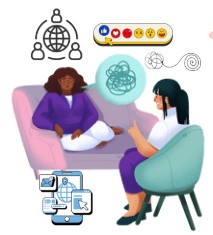In a time of swift technological development, psychology is going through a significant transition. Numerous cutting-edge methods that are changing mental health treatment, research, and our comprehension of the human mind have emerged from the nexus of psychology and technology. This article explores some of the most notable developments in this ever-evolving discipline.

Psychology and Technology : Current Trends
Telehealth and Digital Therapeutics
The delivery of mental health care has been transformed by the emergence of telehealth, which has made it easier and more accessible than before. Virtual support groups, mental health applications, and online treatment platforms have become important resources for people looking for mental health assistance. A growing number of mental health issues are being treated with digital therapies, which use technology to provide evidence-based interventions.
Artificial Intelligence in Mental Health
The application of artificial intelligence (AI) in mental health treatment is growing. Chatbots with AI capabilities can respond to inquiries, advise coping mechanisms, and offer round-the-clock assistance. Large volumes of data can be analyzed by AI algorithms to find trends and forecast mental health problems, allowing for early intervention. Additionally, machine learning is being utilized to maximize therapeutic interventions and customize treatment strategies.
Virtual Reality Therapy
Immersion environments created with virtual reality (VR) technology can assist people in facing their worries and concerns. VR therapy has demonstrated potential in the treatment of several anxiety disorders, including PTSD and phobias. VR therapy can assist people in developing coping strategies and lowering their fear reactions by progressively exposing them to virtual scenarios that cause their anxiety.

Wearable Technology and Biometrics
Wearable technology, such fitness trackers and smartwatches, can gather a lot of information on a person’s physiological condition, such as heart rate, sleep habits, and level of activity. Monitoring mental health and identifying early indicators of distress can be done with this data. Additionally, biometric sensors can be used to gauge emotional reactions and stress levels, offering important information about a person’s mental health.
Social Media and Mental Health
Our lives now revolve around social media, and study on how these platforms affect mental health is still underway. Social media can help people connect and encourage one another, but it can also exacerbate anxiety, sadness, and feelings of inadequacy. In order to create tactics for encouraging positive online conduct, researchers are examining the intricate connection between social media use and mental health.
Read more about overcome brain rot due endless scrolling, binge-watching.

Neuroscience and Brain Imaging
The neural underpinnings of mental health diseases are becoming more understood because of developments in neuroscience and brain imaging technology. Electroencephalography (EEG) and functional magnetic resonance imaging (fMRI) can be used to examine brain activity and spot trends linked to various mental health issues. More focused and efficient treatments are being developed as a result of this research.
Ethical Considerations while using technology is psychology
Addressing the ethical issues that come up as technology is incorporated into mental health treatment more and more is essential. To guarantee that technology is used sensibly and morally, concerns like data privacy, secrecy, and the possibility of bias in AI algorithms must be properly taken into account.
Future of Psychology and Technology
The fast developing subject of psychology and technology intersection holds promise for revolutionizing mental health treatment and our comprehension of the human mind. We may anticipate seeing even more creative methods surface as technology develops further, resulting in more individualized, easily accessible, and efficient mental health care.
Conclusion
Technology’s incorporation into psychology has created new opportunities for mental health study, care, and prevention. These developments, which range from wearable technology and VR therapy to telehealth and artificial intelligence, are changing the face of mental health care. Prioritizing ethical issues and making sure that these tools are utilized to enhance the lives of people dealing with mental health issues are crucial as we continue to investigate the nexus between psychology and technology.
References
- Technology and the future of mental health treatment. (n.d.). National Institute of Mental Health (NIMH).
- Bulkes NZ, Davis K, Kay B, Riemann BC. Comparing efficacy of telehealth to in-person mental health care in intensive-treatment-seeking adults. J Psychiatr Res. 2022 Jan;145:347-352. doi: 10.1016/j.jpsychires.2021.11.003. Epub 2021 Nov 3. PMID: 34799124; PMCID: PMC8595951.
- Stewart, D. (n.d.). Psychology and Technology: Current trends shaping our world. Alliant International University.
Subscribe to PsychUniverse
Get the latest updates and insights.
Join 3,041 other subscribers!
Niwlikar, B. A. (2025, February 13). Psychology and Technology Going Hand in Hand. PsychUniverse. https://psychuniverse.com/psychology-and-technology-going-hand-in-hand/



